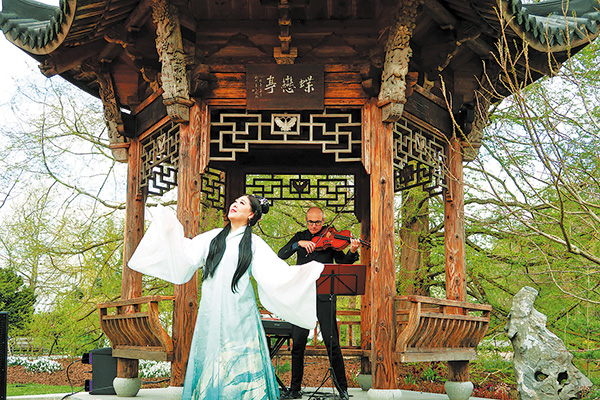

A well-known legend in China, the love story has inspired numerous artistic interpretations, including traditional operas, dances, and movies.
The idea of writing an Italian opera about it emerged naturally, after Wang chatted with Granitzio about their future plans following a concert in London in 2016.
At that time, Granitzio had just returned to Europe after visiting the Conservatory of Sichuan, in China's southwestern city Chengdu, where he became immersed in Chinese culture and traditional music.
Wang, who studied opera in Milan from 2009 to 2011 and also attended the Royal Birmingham Conservatoire and the Royal Northern College of Music, had, at that time, started to actively perform in the United Kingdom.
Wang recalls that Granitzio was interested in creating music about China, so she encouraged him to write an opera.
"He was a bit hesitant at first because writing an opera is a huge project, but I kept encouraging him," Wang says.
The creation process was long and arduous. Wang first sent Granitzio an English language script of an existing Chinese opera based on the legend, then Granitzio made an Italian translation and wrote an original libretto, after studying the nuances of different versions of the story.
"It's a cross-cultural project, so there are times when I have to explain the subtleties of many Chinese expressions, so they can be best rendered in Italian," Wang says.
In 2019, Granitzio started to compose arias and intermezzos for the opera.
When he finished a section in Italy, he would send the scores to Wang in London, so she could try singing them, and they would then discuss revisions.
"The first version of the intermezzos sounded too Western, so I suggested Granitzio try to add more Chinese elements, such as pentatonic scale, which is widely used in Chinese music," Wang says.
"Now, when you hear the intermezzos, you recognize its Chinese flavor."
The majority of the opera was written during the pandemic, and it was penned to include Chinese traditional instruments, such as guzheng (Chinese zither), erhu (two-stringed bowed instrument) and xiao (vertical bamboo flute).
"There are a lot of bridges between Italy and China; just think about Marco Polo, and also the Silk Road. The aim of this opera is to build a bridge again through culture between two very far countries," says Granitzio.
"But they're not far at all. When you are using music as a universal language, it's very easy to talk, even if one is Chinese and the other is Italian."